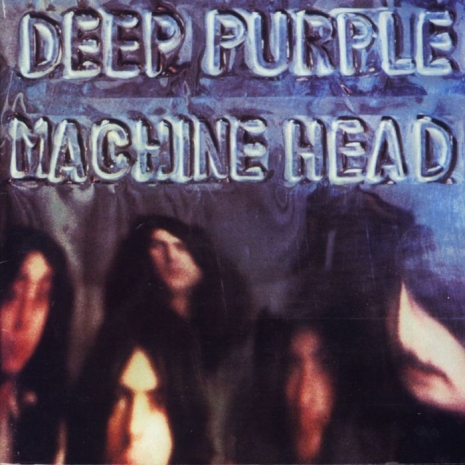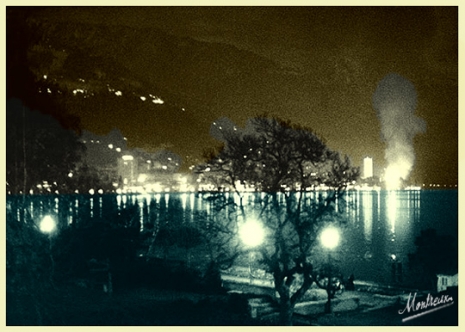
Deep Purple’s “Smoke on the Water,” amirite?
Although it is among the most popular guitar riffs in history (if not the #1 most popular riff of all time, because virtually anyone, including your mom, can probably play it) and certainly a song that will never, ever fall out of the classic rock canon, the meaning of the song’s lyrics—once well-known—are becoming increasingly cryptic. It would just be confusing to most people hearing it for the first time playing Guitar Hero or Rock Band:
We all came out to Montreux
On the Lake Geneva shoreline
To make records with a mobile
We didn’t have much time
Frank Zappa and the Mothers
Were at the best place around
But some stupid with a flare gun
Burned the place to the ground
On December 4, 1971 Deep Purple were in Montreux, Switzerland. The plan was to record their next album—what would become their 1972 classic, Machine Head—in the theater of the cavernous Montreux Casino, which was closing down for renovations after a matinee show by the Mothers of Invention.
As the members of Deep Purple watched, the rockin’ teen combo led by Frank Zappa laid into their concert showstopper of the time “King Kong,” when an idiot in the audience fired a flare gun (or more likely a bottle rocket) into the venue’s rattan-covered ceiling during Don Preston’s MiniMoog solo. Although no one was badly injured, the huge casino, along with its theater, restaurants and other entertainment facilities was burned to the ground and the Mothers’ gear was toast. There was an apparently easy and orderly exit for the crowd as the fire was slow at first, but as Deep Purple’s bass guitarist Roger Glover later said “when it caught, it went up like a fireworks display.” Two of Zappa’s roadies, the last to leave, were blown out of a window, but sustained only minor injuries.

A postcard of the fire
They burned down the gambling house
It died with an awful sound
Funky Claude was running in and out
Pulling kids out the ground
Even if you don’t know what it means, it sounds good, right?
“Funky Claude” who was “running in and out” refers to Claude Nobs, the casino’s owner and the director of the Montreux Jazz Festival—and as luck would have it, a volunteer fireman—who helped some of the audience members escape to safety and to whom Machine Head was dedicated. He later told Gibson.com
Frank Zappa took his guitar–a Gibson, a very strong one–and he smashed the big window down with his guitar. Then a lot of people could go out through there. The people went out through that exit, and within about five minutes, the 2,000 kids were out. And the people were watching the fire thinking, “Oh, you know, Frank Zappa is just doing an incredible ending to his show.”
As if! If you listen to a bootleg recorded that afternoon, you can hear Howard Kaylan drily quip “Fire. Arthur Brown... in person” as it dawns on him what is transpiring.
Frank Zappa was interviewed for French television soon after the fire.
Here’s how Zappa later recalled the incident:
The 1971 European winter tour gets the award for being the most disastrous. On December 4, we were working at the Casino de Montreux in Geneva, Switzerland, right on the edge of the lake—just in front of Igor Stravinsky Street—a venue noted for its jazz festivals.
In the middle of Don Preston’s synthesizer solo on “King Kong,” the place suddenly caught fire. Somebody in the audience had a bottle rocket or a Roman candle and had fired it into the ceiling, at which point the rattan covering started to burn (other versions of the story claim the blaze was the result of faulty wiring).
There were between twenty-five hundred and three thousand kids packed into the room- well over capacity. Since more kids were outside, trying to get in, the organizers had cleverly chained the doors shut. When the fire began, the audience was left with two ways out: through the front door, which was pretty small, or through a plate-glass window off to the side of the stage.
I made an announcement- something like: “Please be calm. We have to leave here. There is a fire and why don’t we get out?” You’d be surprised how well people who speak only French can understand you when it’s a matter of life and death. They began filing out through the front door.
As the room was filling with smoke, one of our roadies took an equipment case and smashed the big window. The crew then began helping people to escape through it into some kind of garden place below. The band escaped through an underground tunnel that led from behind the stage through the parking garage.
A few minutes later the heating system in the building exploded, and Some people were blown through the window. Fortunately, nobody was killed and there were only a few minor injuries- however, the entire building, about thirteen million dollars’ worth, burned to the ground, and we lost all our equipment.
Six days later Zappa would be pushed from the stage of the Rainbow Theatre in London by an irate loser named Trevor Charles Howell who was jealous that his girlfriend thought Zappa was cute. He’d spend the next year in a wheelchair.
When it all was over
We had to find another place
But Swiss time was running out
It seemed that we would lose the race.
The race for time to record their new album that is, with the clock ticking on their pricey rental of the Rolling Stones Mobile Studio and their strictly limited Swiss work visas. Nobs helped the band rent another venue, called The Pavilion, but soon after the band started recording, the neighbors complained to the local police, forcing the band to leave after they’d put down the backing tracks for just one song (what would soon become “Smoke on the Water.”)
We ended up at the Grand Hotel
It was empty, cold and bare
But with the Rolling truck Stones thing just outside
Making our music there
With a few red lights, a few old beds
We made a place to sweat
No matter what we get out of this
I know, I know we’ll never forget
A week later, with the mobile studio still racking up hefty rental fees, the band found the nearly-empty Montreux Grand Hotel and converted it into a makeshift recording studio, playing in the stairwells and hallways and using mattresses to deaden the sound.
The lyrics to “Smoke on the Water” were composed mostly by Ian Gillan, and based around a title Roger Glover had thought of watching the fire billow over Lake Geneva from his hotel room. The song was completed at the sessions at the Grand Hotel.
Apparently “Smoke on the Water” more or less began as a little tribute/thank you to Claude Nobs for helping them out—and for his heroism during the conflagration—and nothing more. Glover felt the song title would falsely indicate pot smoking and Ritchie Blackmore has said that he felt sheepish being the supposedly hotshot guitarist and bringing such a simple, plodding tune to his bandmates. Nobs said of hearing the song for the first time:
One day they were coming up for dinner at my house and they said, “Claude we did a little surprise for you, but it’s not going to be on the album. It’s a tune called ‘Smoke On The Water.’” So I listened to it. I said, “You’re crazy. It’s going to be a huge thing.” Now there’s no guitar player in the world who doesn’t know [he hums the riff]. They said, “Oh if you believe so we’ll put it on the album.” It’s actually the very precise description of the fire in the casino, of Frank Zappa getting the kids out of the casino, and every detail in the song is true. It’s what really happened. In the middle of the song, it says “Funky Claude was getting people out of the building,” and actually when I meet a lot of rock musicians, they still say, “Oh here comes Funky Claude.”
Even so, it was about a year after Machine Head‘s 1972 release that “Smoke on the Water” came out as a single. By May of 1973, Ian Gillan had already quit the band.
In fact, there is but a single—one, uno, that’s it—vintage clip of Deep Purple Mk. II performing the song, and here it is: